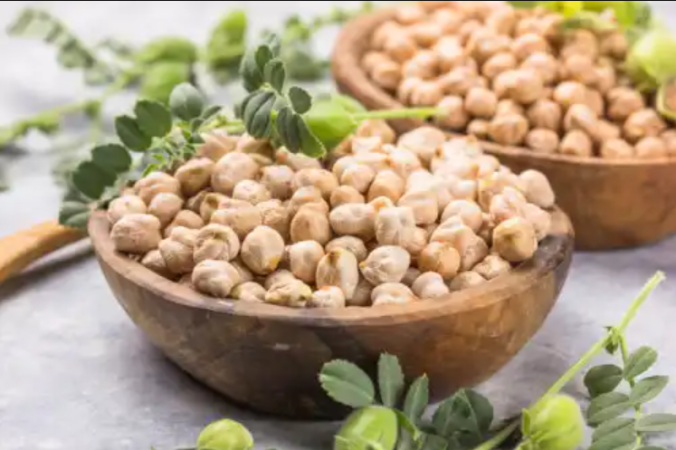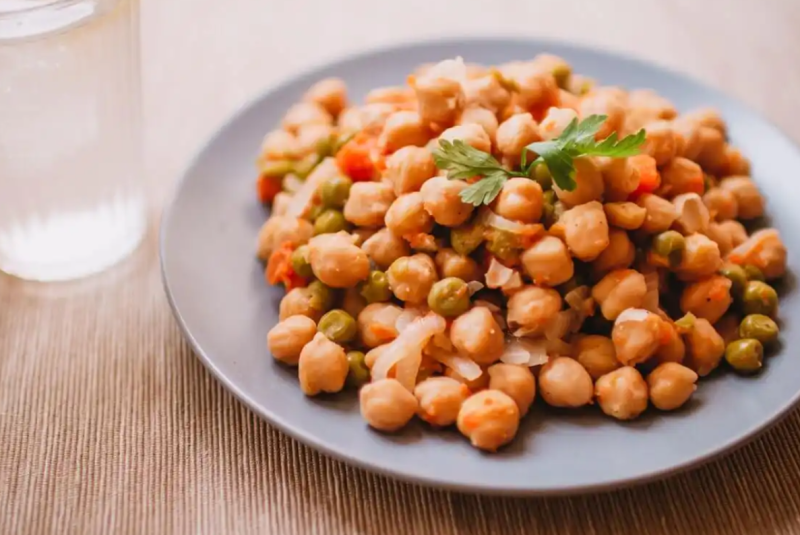
When talking about legumes, very few are as famous as chickpeas. These tiny grains can be eaten in hot and cold preparations and combine well with various foods.
For this reason, there are a variety of recipes to enjoy throughout the year, and it is not surprising that in many areas of the world, they are consumed regularly. Do cold salads with chickpeas, stews, or hummus-type creams sound familiar? Surely yes.
On the other hand, would you know the benefits of chickpeas? Regardless of how you have eaten them, the truth is that you should know their nutritional contribution so that you are encouraged to include them more regularly in your menu.
Contents
The chickpea: leguminous plant
Its scientific name is Cícer arietinum L. It is a leguminous plant whose seeds are highly appreciated. The most common is spherical, rough, and beige. It is not known what its origin is; it is thought that it may come from western Asia or the Mediterranean basin.
However, it is clear that before writing was invented, human beings consumed it. In this regard, relics have been found in regions as distant as Persia, India, Egypt, and Sicily.
There is talk of two varieties in some sources and three in others. These are:
- Kabuli: it is the most cultivated both in Europe and in Central and South America;
- Desi is cultivated in India and other regions with tropical and semi-arid climates; the seeds are more minor, black, or yellowish.
- Gulabi: unlike other varieties, this one has a smooth surface; although it is also rounded, it looks like a pea
Modes of consumption and preparation
Chickpea is widely used and appreciated in cooking around the world. It can be consumed in several ways. In the form of flour, it is an ingredient used in dishes such as FalafFalafeln batter.
The most common way to eat them is grain. For this, they are soaked for several hours (a minimum of 12 is recommended), then cooked with enough water; you can add vegetables and pieces of meat to the taste of each one.
It can also be added to salads or eaten toasted as a snack. There are a few famous dishes with chickpeas: the Arabic above falafFalafelmus, Madrid-style tripe, a soup called ajiaco, typical of the Andes (between Colombia and Venezuela), and much more.
Health benefits of chickpeas
Experts from the Spanish Nutrition Foundation (FEN) indicate they are a source of “vegetable protein, calcium, potassium, iron, phosphorus, magnesium, folates, niacin, vitamin B6 and vitamin E”. Additionally, they provide soluble and insoluble fiber.
Taking into account its nutritional value, chickpeas are considered a food capable of providing various health benefits. Can you say which ones? Whether it is so, or if you have doubts, read everything we will discuss below.
1. They provide protein
 This is possibly one of the best-known benefits of chickpeas. Its high protein content of plant origin makes it ideal for vegetarians.
This is possibly one of the best-known benefits of chickpeas. Its high protein content of plant origin makes it ideal for vegetarians.
However, chickpeas are not “complete” as they contain some essential amino acids, but not all that is needed. This means that it should not be the only source of protein that you choose. Even so, they are still an optimal alternative for growth and development.
2. They provide vitamin E
As FEN experts indicate, chickpeas are a source of vitamin E that “acts as an antioxidant, helping to protect cells against damage caused by free radicals.”
And remember that vitamin E helps to have beautiful skin, strengthens the immune system, and collaborates with cells in various functions.
3. They regulate intestinal transit
Digestion could be considered the starting point for the body’s health since, by doing it correctly, we can assimilate the nutrients we need. For this reason, making sure that it is working correctly can be the key to overall well-being. Thanks to its contribution of fiber, chickpeas benefit you in the following way:
- They reduce abdominal inflammation.
- They allow you to maintain your regular bowel movements.
- They relieve abdominal distension and constipation.
- They help your body absorb all the nutrients from the food.
- According to research, dietary fiber helps prevent gastrointestinal diseases by stimulating motility.
4. They facilitate weight loss
Again, because of their fiber content, chickpeas are foods that support weight loss. According to research, chickpeas benefit glycemic control and aid body weight control through appetite suppression and energy intake.
- Being rich in fiber, they help to satisfy your appetite and avoid snacking between meals, which prevents you from losing those extra kilos.
- They also promote good intestinal transit, which reduces inflammation in the abdominal area and is one of the points most interesting to decrease in the early stages.
- On the other hand, the mixture of nutrients and minerals keeps your body energized and active.
5. They help to have healthy bones and muscles
Minerals identified in chickpeas include:
- iron
- match
- magnesium
- copper
- zinc
6. They protect the health of the heart
The nutrients in chickpeas support cardiovascular health in two different ways. For one thing, the only fats in chickpeas are omega-3 fatty acids. As you may already know, they are beneficial polyunsaturated fats that the body needs to protect the heart and help reduce inflammation.
Likewise, several of the different minerals that chickpeas contain, mentioned in the previous point, favor the cardiovascular system in general.
Different studies have supported the ability of legumes to improve lipid profile, glycemic control, and blood pressure, which are the main risk factors for the development of cardiovascular diseases.
7. They collaborate in the health care of babies
Folic acid is an essential B-complex vitamin. It is more often associated with women’s health because of the potential benefits it can have on them, especially during pregnancy.
On the other hand, low levels of folic acid are closely related to neural tube defects and other complications in the birth of babies. Because of this, if you are pregnant, adding chickpeas to your diet ensures a good source of folic acid that will allow you to have a very healthy baby.
8. They provide calcium
Yes, chickpeas are a good source of calcium, a mineral with many vital functions in the body, closely related to bone health. This is fundamental for women of pre or postmenopausal age to prevent osteoporosis. Adults should consume 1,000 milligrams (mg) of calcium daily. And a glass of milk provides almost a third of this.
9. Diabetes and obesity
According to some research, the WHO recommends the consumption of chickpeas and other legumes to reduce the risks of diseases associated with food, such as type 2 diabetes mellitus and obesity. In this regard, it is noted that people with diabetes who consume diets high in fiber show lower blood glucose levels.
10. Fatigue and sports
Due to its contribution to carbohydrates and proteins, chickpeas are highly recommended in diets for those who perform great physical effort. In particular, they are usually included in the diet of athletes.
In this regard, in a study where various bars were tested to complement the diet of athletes, it was observed that adding roasted chickpea flour increases both the protein content and diversity, providing a significant percentage of the recommended daily amount.
11. Benefits for the environment
Last but not least, chickpeas and other legumes are suitable for the environment because their cultivation helps fix nitrogen in the soil and contributes to the reduction of greenhouse gases. And this somehow also affects our health.
The benefits of chickpeas are not all you should consider
Although the benefits of chickpeas are lovely, they also provide us with compounds called purines. The body usually breaks down these purines into uric acid. For this reason, if you have medical problems such as kidney stones, gallstones, or gout, it is best to avoid chickpeas. In this case, their benefits are minimal compared to the damage they can cause us. Therefore, as a final recommendation, we highlight the importance of coordinating dietary changes with the doctor’s evaluation, which must be based on each person’s state of health.